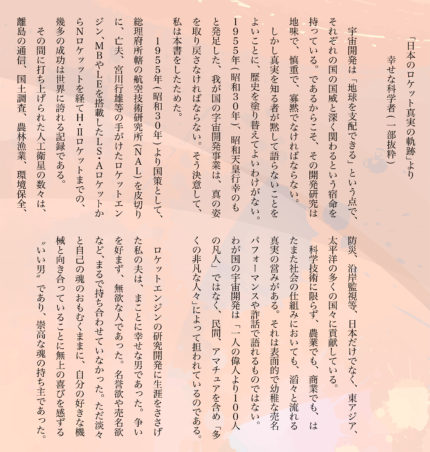- JEPAA Member

- Essay
- Teruko Miyakawa
- エッセイ
- 宮川輝子
© 2024 Teruko Miyakawa.
SCROLL
Portfolio /作品一覧
- 「日本のロケット 真実の軌跡」より幸せな科学者」より抜粋/Excerpts from “Happy Scientists” from “Japanese Rocket: The True Story of a Japanese Rocket
- 「日本のロケット 真実の軌跡」より幸せな科学者」より抜粋 ドイツ語/Excerpts from “Happy Scientists” from “Japanese Rocket: The True Story of a Japanese Rocket
view more
Interview Article /対談記事
(2023年特別対談 宮川輝子×ゲルマー・トモコ)

凜として輝き続ける
日本女性の代表
ゲルマー・トモコ(以下 ゲルマー):宮川先生とこうしてお会いするのは今日が初めてになるのですが、驚きました。お綺麗ですね。立ち姿もとても美しいです。
宮川輝子(以下 宮川):いえいえ、そんなことござい ませんよ。もう90ですので。 ゲルマー:書籍を拝読させて頂いていたのでご年齢は 以前から存じておりましたが、全くそうは見えません!本当にお若いですね。
宮川:ありがとうございます。
ゲルマー:先生はドイツには来られたことはあります か?
宮川:一度ベルリンにはいったことがあります。1973 年だったと記憶しております。当時は東と西で分断さ れていて、境界線となるところには鉄条網が張ってあ りました。とても重々しい空気が残っていた時代でし たね。
ゲルマー:そうだったようですね。あの時代はドイツ にとって激動の時代だったので、その話は今でもよく 聞きます。場所は違えど先生も激動の時代を勇ましく 歩んでこられたようですね。『八十九歳 凛として今を咲く』には先生が力強く生きてこられた足跡と今後の社会に対してのメッセージが込められていて、感銘 を受けました。
宮川:ありがとうございます。89歳の時に、今の思い をしっかり言葉にしておこうと思いましてね。もしかしたら100 歳になった時に改めて書き直すかもしれな いですけれど(笑)
ゲルマー:人柄を繕ったりせず率直な言葉で考えを伝えていらっしゃるからこそ先生の言葉にはとても重み があるように思います。
宮川:どちらかというと体が勝手に動いてしまうんで す。当時はやるしかないと思って日々を懸命に過ごし ておりました。
ゲルマー:以前執筆されていた静音権に関しての活動 ですか?
宮川:そうですね。1970 年代に「騒音に関して」の 意見を私のところにお寄せくださった方々がいらっしゃったんですね。それで街の騒音問題に気付かされ まして。そこから率先して活動をしました。当時は女性が三人集まれば社会を変えられるかもしれないと思 えるほど勢いがあって、環境省や建設省、東京都の知事室にもどんどん入っていきましたね。我ながらあの 時はパワフルだったと思います。
ゲルマー:そこまでされていらっしゃったんですか。 すごいですね。色々な書類を提出しなさいと各行政か ら言われたのではないですか。
宮川:確かに文章を書くことが本当に苦手でしたが、 全て勢いで書き上げてしまいました。最初は文章を書いては消し、書いては消しということをやっていましたが、それでは間に合わないと。その時に伝わる文章 を書けばいいんだと思ってその勢いのまま書きました。その書き方は今でも変わっておりませんね。
ゲルマー:先生の言葉はわかるという以上に伝わって くるという感覚ですね。私も勢いで次々と読んでしまいました。文章の中にある熱量はすごいです。
宮川:ありがとうございます。私の文章をお読みに なった方からも「情熱が伝わった」という声がよく寄せられています。それと、今でも毎日着物を着て帯を 締めて会社に行って朝礼をしているので、社員からはパワフルだと思われているかもしれません。
ゲルマー:毎日朝礼というのはすごいですね。どのよ うなことをされるのですか?
宮川:社訓や倫理、仕事をする上での誇り、高い視座 から物事を見ることの重要性を伝えるようにしていま す。私は人間として生きる上で最も大切なのは倫理観 だと思っているんです。社員の方はとてもそれを理解 してくださるので大変感謝しています。
ゲルマー:倫理観を大切にしようと強く意識したきっ かけがあったのでしょうか。
宮川:父の影響が大きかったですね。厳しい人でした が心が広く、倫理的な父でした。その父の背中を見て いたものですから私も環境問題に対して真剣に取り組 もうと思えたのかもしれません。
ゲルマー:先生が力強く行動を起こす背景にはお父様 がいらっしゃったのですね。
宮川:私と同じ時代を生き抜いてきた女性たちは本当 に若々しくて強いですよ。
ゲルマー:宮川先生は、その若くて強い女性の代表と 言えるのではないでしょうか。
宮川:いえいえ、ただいつも真剣に目の前のことに取 り組んだだけです。私たちが生きた時代は今のように 寿命が長くなかったので、限りある時間を懸命に生き ようと思ってきた結果ではないでしょうか。
ゲルマー:だからこそあらゆる物事に真剣に向き合ってこられたのですね。
宮川:だから今も精一杯生きようとは思っています。 姿勢ひとつとってもそうです。年齢に負けて背中を曲 げるのは簡単です。でも私はそれを今後も受け入れる つもりはありません。 ゲルマー:素晴らしいです。私も先生のように誇りを 持って胸を張って毎日を過ごしていけるよう努めてい きたいと思います。
2023 Special Dialogue: Teruko Miyakawa × Tomoko Germar
An exemplar of Japanese women, continuing to shine with dignity
Tomoko Germar: Ms. Miyakawa, this is the first time we meet in person, and I am impressed. You are quite beautiful. And you have a lovely standing posture.
Teruko Miyakawa: No, not at all. I mean, I’m 90 years old.
Germar: I’ve read your books and I do know your age, but you don’t look it at all! You look really young.
Miyakawa: Thank you very much.
Germar: By the way, have you ever been to Germany before?
Miyakawa: I’ve been to Berlin once. I remember it was in 1973. At that time, the city was divided into East and West, separated by barbed wire barricades. It was that kind of time with a quite heavy atmosphere.
Germar: So I’ve heard. It was a turbulent time for Germany, and I still hear stories about it. You also went bravely through those turbulent times, even though you were elsewhere. I was impressed by your book “Blooming at the Age of Eighty-Nine” which reflects back on the powerful life you have lived and expresses your message for society in the future.
Miyakawa: Thank you very much. At the age of 89, I decided to put my current thoughts into words. I may rewrite them when I reach 100 years of age, though (she laughs). Germar: I think your words carry a lot of weight because you convey your thoughts so frankly, without trying to hide your personality.
Miyakawa: Well, my body just keeps moving on its own. At the time, I spent my days trying incredibly hard, thinking that I had no choice but to do this.
Germar: Is that a time when you were working on “Right to Quiet” that you wrote about previously?
Miyakawa: Yes, that’s right. In the 1970s, many people would send me their opinions in regard to excessive noise. That made me aware of the noise problem in the city. From there, I took the initiative and started working on this issue. At that time, the momentum seemed so strong that if three women got together, we might be able to change society. So we went to the Ministry of the Environment, the Ministry of Construction, and the Tokyo Governor’s Office. I think we were very powerful at that time.
Germar: So you went to those lengths. That’s amazing. The various government agencies must have told you to submit all kinds of documents.
Miyakawa: Yes, I wrote everything very energetically, but actually I was really bad at writing at the time. At first I did write and erase repeatedly, but then I realized that I’d never make it in time doing that. I needed to write sentences that would be understood at the time, so I incorporated that momentum into my writing. And that style of writing has not changed.
Germar: Rather than merely understand your words, I can feel them. I devour your works, one after another. The passion in your writing is amazing. Miyakawa: Thank you very much. I often receive comments from people who have read my writing and they say that they can sense my passion. And my employees might think I’m powerful because I still go to the office every day and have a morning meeting, wearing a traditional kimono and obi.
Germar: It’s amazing that you attend the morning meeting every day. What kind of things do you say at the meetings?
Miyakawa: I try to convey our company motto, ethics, pride in our work, and the importance of seeing things from a higher perspective. I believe that as human beings, the most important thing in our lives is a sense of ethics. I am truly grateful that my employees understand this so well.
Germar: What made you so strongly aware of the importance of ethics?
Miyakawa: My father was a huge influence on me. He was strict, but open-minded and ethical. Perhaps it was watching him work that inspired me to take environmental issues so seriously.
Germar: Interesting. So your father was a factor behind your powerful activism.
Miyakawa: Women who have lived through the same era as me tend to be really youthful and strong.
Germar: And I think you are a leading representative of those youthful, strong women. Miyakawa: Not really. I just always took the task in front of me seriously. Back in our time, the life-span was not as long as it is now, so I think it’s the result of trying to make the most of my limited time.
Germar: So that’s why you’ve faced everything so seriously.
Miyakawa: And that’s why I still try to live life to the fullest. This is true even for my posture. It is too easy to accept that age can bend or break us. However, I am not going to accept that from here on out. Germar: That’s wonderful. I’m going to try to live every day with a sense of pride, just like you do.
Profile /経歴
宮川輝子 Teruko Miyakawa
1933年 東京都出身
日本女子大学卒業
環境公害研究所設立
作品出展国遍歴(JEPAA関連事業):ドイツ、シンガポール、カナダ他
Born: 1933 Tokyo, Japan
Education: Japan Women’s University
Activities:Foundation of environment Pollution Laboratory
Exhibition of Works(JEPAA): Germany, Singapore, Canada…



-430x485.jpg)

